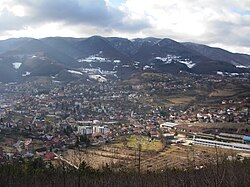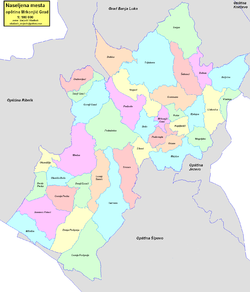Mrkonjić Grad (Serbian Cyrillic: Мркоњић Град, pronounced [mr̩koɲit͡ɕ grad]) is a town and municipality in Republika Srpska, Bosnia and Herzegovina. It is located in the Bosanska Krajina region, between Banja Luka and Jajce. As of 2013, the municipality has a population of 16,671 inhabitants, while the town of Mrkonjić Grad has a population of 7,915 inhabitants.
Mrkonjić Grad
Мркоњић Град | |
|---|---|
Town and municipality | |
 Mrkonjić Grad | |
 Location of Mrkonjić Grad within Bosnia and Herzegovina | |
 | |
| Coordinates: 44°25′N 17°05′E / 44.417°N 17.083°E | |
| Country | |
| Entity | |
| Geographical region | Bosanska Krajina |
| Government | |
| • Municipal mayor | Dragan Vođević (SNSD) |
| Area | |
| • Total | 677.43 km2 (261.56 sq mi) |
| Population (2013 census) | |
| • Total | 16,671 |
| • Density | 25/km2 (64/sq mi) |
| Time zone | UTC+1 (CET) |
| • Summer (DST) | UTC+2 (CEST) |
| Area code | 50 |
Name
editThe town changed its name several times in history: Gornje Kloke, Novo Jajce, Varcarev Vakuf, Varcar Vakuf, and ultimately the present one. The last renaming took place in 1924 after King Peter I of Serbia, who had taken the nom de guerre "Mrkonjić" while fighting in the uprising (1875–78) against the Ottoman Empire.
History
editFrom 1929 to 1941, Mrkonjić Grad was part of the Vrbas Banovina of the Kingdom of Yugoslavia.
In World War II, the town became renowned by the first meeting of ZAVNOBiH on 25 November 1943, when Bosnia and Herzegovina was proclaimed as a common republic of Serbs, Croats and Muslims.
During the Bosnian War from 1992 to 1995, the town was within the territory controlled by ethnic Serbs. The town is also known for the Mrkonjić Grad incident where the USAF lost one F-16 in June 1995.[1] The pilot of the jet, Scott O'Grady, was stranded in the area for six days before being rescued by US Marines. From 8 to 12 October 1995, Mrkonjić Grad was in the hands of the Croatian Army (HV) and the Croatian Defence Council (HVO).
After the Dayton Peace Agreement the town was assigned to the entity of Republika Srpska.[2] As a consequence, the Croat population of the town had no choice but to leave, and there are very few Croats living in Mrkonjić today, most of them elderly. In 1996, a mass grave containing the bodies of 181 Serbs—mostly civilians—was uncovered in Mrkonjić Grad. Almost all were killed by Bosniak and Croat forces in late 1995.[3] Bosnian Serbs committed a massacre of 28 Croat and Bosniak civilians, who were abducted from their homes in Mrkonjić Grad, and executed in Oborci, on 13 September 1995.[4]
-
Bočac fortress
-
American pilot Scott O'Grady was shot down by the Bosnian Serb army in the Bosnian war
-
Plaque commemorating the victims thrown into a mass grave by Bosniak and Croat forces
Demographics
editPopulation
edit| Population of settlements – Mrkonjić Grad municipality | |||||||||||
|---|---|---|---|---|---|---|---|---|---|---|---|
| Settlement | 1910. | 1921. | 1931. | 1948. | 1953. | 1961. | 1971.[5] | 1981.[6] | 1991.[7] | 2013.[8][9] | |
| Total | 20,620 | 27,014 | 29,178 | 31,127 | 30,949 | 30,159 | 29,684 | 26,278 | 16,671 | ||
| 1 | Baljvine | 1,140 | 333 | ||||||||
| 2 | Bjelajce | 980 | 693 | ||||||||
| 3 | Brdo | 587 | 548 | ||||||||
| 4 | Donji Baraći | 524 | 287 | ||||||||
| 5 | Donji Graci | 358 | 206 | ||||||||
| 6 | Gerzovo | 679 | 256 | ||||||||
| 7 | Gornji Graci | 926 | 556 | ||||||||
| 8 | Gustovara | 428 | 208 | ||||||||
| 9 | Kopljevići | 489 | 296 | ||||||||
| 10 | Kotor | 443 | 311 | ||||||||
| 11 | Majdan | 946 | 408 | ||||||||
| 12 | Medna | 791 | 221 | ||||||||
| 13 | Mrkonjić Grad | 2,249 | 2,770 | 4,089 | 6,602 | 8,422 | 7,915 | ||||
| 14 | Oćune | 447 | 215 | ||||||||
| 15 | Orahovljani | 463 | 263 | ||||||||
| 16 | Podbrdo | 991 | 731 | ||||||||
| 17 | Podorugla | 849 | 921 | ||||||||
| 18 | Podrašnica | 1,096 | 733 | ||||||||
| 19 | Šehovci | 642 | 251 | ||||||||
| 20 | Stupari | 435 | 288 | ||||||||
| 21 | Trijebovo | 509 | 211 | ||||||||
| 22 | Jasenovi Potoci | 284 | 98 | ||||||||
Ethnic composition
edit
| Ethnic composition – Mrkonjić Grad town | |||||||
|---|---|---|---|---|---|---|---|
| 2013.[8][9] | 1991.[7] | 1981.[6] | 1971.[5] | ||||
| Total | 7,915 (100,0%) | 8,422 (100,0%) | 6,602 (100,0%) | 4,089 (100,0%) | |||
| Serbs | 7,130 (96,7%) | 5,945 (70,59%) | 4,077 (61,75%) | 2,156 (52,73%) | |||
| Bosniaks | 115 (1,6%) | 1,450 (17,22%) | 1,414 (21,42%) | 1,419 (34,70%) | |||
| Yugoslavs | 52 (0,7%) | 470 (5,581%) | 618 (9,361%) | 62 (1,516%) | |||
| Croats | 74 (1,0%) | 454 (5,391%) | 427 (6,468%) | 406 (9,929%) | |||
| Others | 103 (1,223%) | 19 (0,288%) | 18 (0,440%) | ||||
| Montenegrins | 30 (0,454%) | 21 (0,514%) | |||||
| Albanians | 11 (0,167%) | 6 (0,147%) | |||||
| Macedonians | 6 (0,091%) | 1 (0,024%) | |||||
| Ethnic composition – Mrkonjić Grad municipality | |||||||
|---|---|---|---|---|---|---|---|
| 2013.[8] | 1991.[7] | 1981.[6] | 1971.[5] | ||||
| Total | 16,671 (100,0%) | 27,395 (100,0%) | 29,684 (100,0%) | 30,159 (100,0%) | |||
| Serbs | 16,050 (96,27%) | 21,057 (76,86%) | 23,364 (78,71%) | 24,990 (82,86%) | |||
| Bosniaks | 375 (2,249%) | 3,272 (11,94%) | 3,009 (10,14%) | 2,734 (9,065%) | |||
| Croats | 159 (0,954%) | 2,139 (7,808%) | 2,290 (7,715%) | 2,204 (7,308%) | |||
| Others | 87 (0,522%) | 334 (1,219%) | 67 (0,226%) | 82 (0,272%) | |||
| Yugoslavs | 593 (2,165%) | 883 (2,975%) | 98 (0,325%) | ||||
| Montenegrins | 47 (0,158%) | 38 (0,126%) | |||||
| Albanians | 15 (0,051%) | 11 (0,036%) | |||||
| Macedonians | 8 (0,027%) | 1 (0,003%) | |||||
| Slovenes | 1 (0,003%) | 1 (0,003%) | |||||
Economy
editThe following table gives a preview of total number of registered employed people per their core activity (as of 2016):[10]
| Professional field | Total |
|---|---|
| Agriculture, forestry and fishing | 196 |
| Mining and quarrying | 22 |
| Manufacturing | 814 |
| Distribution of power, gas, steam and air-conditioning | 235 |
| Distribution of water and water waste management | 52 |
| Construction | 499 |
| Wholesale and retail, repair | 490 |
| Transportation and storage | 171 |
| Hotels and restaurants | 145 |
| Information and communication | 25 |
| Finance and insurance | 35 |
| Real estate activities | 1 |
| Professional, scientific and technical activities | 74 |
| Administrative and support services | 3 |
| Public administration and defence | 243 |
| Education | 328 |
| Healthcare and social work | 122 |
| Art, entertainment and recreation | 15 |
| Other service activities | 47 |
| Total | 3,517 |
Tourism
editThe Balkana Lake lies near the town and is a small, but beautiful tourist resort including the nearby Skakavac Waterfall.
See also
editReferences
edit- ^ "AFSOUTH Fact sheets". AF South Nato. 7 March 2011. Archived from the original on 7 March 2011. Retrieved 6 August 2016.
- ^ "Dayton Accords - international agreement". Encyclopædia Britannica. Retrieved 6 August 2016.
- ^ "Serbs unearth 181 bodies in mass grave". Independent. 6 April 1996. Retrieved 27 July 2019.
- ^ "Izvršen masakr u Oborcima kod Donjeg Vakufa".
- ^ a b c "1971 Census" (PDF). stat.gov.rs.
- ^ a b c "1981 Census" (PDF). stat.gov.rs.
- ^ a b c "Bosnia & Herzegovina". pop-stat.mashke.org.
- ^ a b c "2013 Census" (PDF). rzs.rs.ba.
- ^ a b "Popis 2013 u BiH". www.statistika.ba. Retrieved 22 April 2022.
- ^ "Cities and Municipalities of Republika Srpska 2017" (PDF). rzs.rs.ba (in Serbian). December 2017. Retrieved 21 October 2018.
